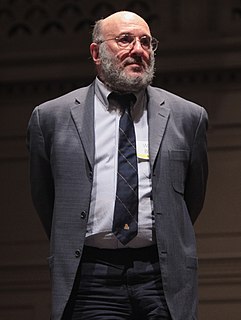A Quote by Russell Kirk
The principle of real leadership ignored, the immortal objects of society forgotten, practical conservatism degenerated into mere laudation of private enterprise, economic policy almost wholly surrendered to special interests.
Related Quotes
The quickest and surest way to production, prosperity, and economic growth is through private enterprise. The best way for governments to encourage private enterprise is to establish justice, to enforce contracts, to insure domestic peace and tranquility, to protect private property, and to secure the blessings of liberty including economic liberty - which means to stop putting obstacles in the way of private enterprise.
If we as a society want to cure unemployment, raise real wages, and in other ways improve our economy, we will base public policy on private property rights, the non-aggression principle and the law of free association. In the free and prosperous society, everyone may do precisely as he pleases, provided only that he does not initiate violence against non-aggressors.
Each pursues his private interest and only his private interest; and thereby serves the private interests of all, the general interest, without willing it or knowing it. The real point is not that each individual's pursuit of his private interest promotes the totality of private interests, the general interest. One could just as well deduce from this abstract phrase that each individual reciprocally blocks the assertion of the others' interests, so that, instead of a general affirmation, this war of all against all produces a general negation.
In view of the importance of philanthropy in our society, it is surprising that so little attention has been given to it by economic or social theorists. In economic theory, especially, the subject is almost completely ignored. This is not, I think, because economists regard mankind as basically selfish or even because economic man is supposed to act only in his self-interest; it is rather because economics has essentially grown up around the phenomenon of exchange and its theoretical structure rests heavily on this process.
the Republicans love to say that the Democratic Party is ruled by 'special interests.' But when pressed to name these 'special interests,' the usual reply is women, blacks, teachers, and unions. Those are 'special interests' to be proud of - because together they comprise the majority of Americans. What about the 'special interests' that dominate the Republican Party - the oil companies, the banks, the gun lobby, and the apostles of religious intolerance?
To complete the rout of traditionalists, in America an impression began to arise that the new industrial and acquisitive interests are the conservative interest, that conservatism is simply a political argument in defense of large accumulations of private property, that expansion, centralization, and accumulation are the tenets of conservatives. From this confusion, from the popular belief that Hamilton was the founder of American conservatism, the forces of tradition in the United States never have fully escaped.
Temporary delusions, prejudices, excitements, and objects have irresistible influence in mere questions of policy. And the policy of one age may ill suit the wishes or the policy of another. The constitution is not subject to such fluctuations. It is to have a fixed, uniform, permanent construction. It should be, so far at least as human infirmity will allow, not dependent upon the passions or parties of particular times, but the same yesterday, to-day, and for ever.







































